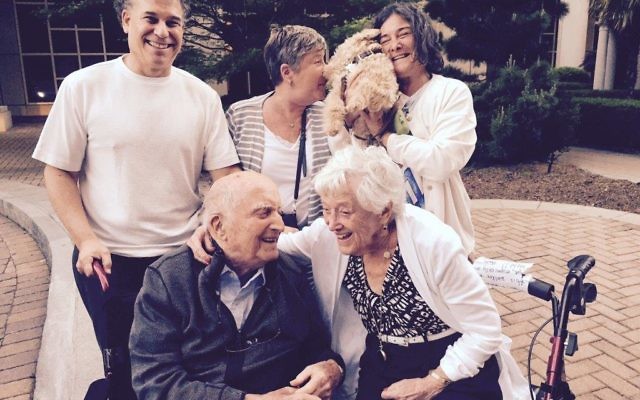Help Offered to Adult Children Becoming Caregivers
A recent AARP report states that 40 million people provide 37 billion hours of unpaid caregiving a year, or 80 percent of the long-term care in this country, but each of us does not have to reinvent this wheel. Weinstein Hospice created the “Kibud Av V’Eim: Navigating the Journey From Child to Caregiver” workshop to help adult children care for aging parents and to help people be creative, deliberate and realistic about their own aging and dying.
Social worker Jenifer Firestone, who is the hospice’s volunteer coordinator and describes her experience caring for 92- and 95-year-old parents for 4½ years as “the most heart-wrenching, anxiety-producing, costly, complicated and frustrating experience of my life,” provided answers to possible questions about the program, which is being offered in a two-session series at Congregation Or Hadash in March and Congregation Beth Jacob in May.
—
Q: What is the journey referred to in the workshop title?

A: Two journeys are taking place at the same time. The first journey is that of older people going from being active, independent and relatively healthy to being less active, having more health problems, and needing increasing assistance and support in daily life. The concurrent journey is for adult children having to provide care and assistance to the people who were their caregivers. Aging parents and children-turned-caregivers are often reluctant to find themselves on these journeys.
Q: Why “navigating”?
A: The journey is not straightforward or clear. There are many, often confusing options and decisions that have significant implications for care recipients and caregivers. Successful navigation requires forethought and familiarity with the possibilities.
Q: Why did Weinstein Hospice create this program?
A: As hospice and geriatric care professionals, we have accompanied hundreds of families as they struggle through these journeys. Aging and dying are difficult under the best of circumstances. These life challenges are exacerbated by denial, resistance, and a lack of emotional and logistical preparation. Our experience with aging and dying has made us aware of what so many people learn the hard way.
Q: What are the biggest challenges to families as aging occurs?
A: The first challenge is the resistance to recognizing the need for and accepting help. The rejection of walkers, electronic medication dispensers, the end of driving and private home care assistance leads to falls, medication errors, dehydration, muscle atrophy, poor nutrition and the increasing weakness that cuts away at people’s prized independence. These problems exacerbate the trauma and frustration of the adult children who are increasingly responsible for their parents.
The second challenge is the dearth of appropriate and affordable living options for aging people. Without the wealth to pay for increasing amounts of private care over five, 10, 15 or more years, a person can’t truly “age in place.” It is not uncommon for elderly people of some means to move from their own home to independent living, then assisted living, then a nursing home. All of those moves take a terrible toll on the elderly and their children. If you don’t have the means to pay 24/7 caregivers or a respectable nursing home, you are looking at the gaping black hole of elder housing.
The third challenge is the lack of chronic and palliative medical care for frail elders who do not meet hospice criteria. Only 1 percent of American physicians specialize in geriatrics, and doctors or nurse practitioners who make house calls can’t make a living from insurance reimbursements. The overtreatment of the elderly in emergency rooms and hospitals often creates more problems than it solves. It is a systemic problem through which each family must find a way.
Q: What are some of the joys of helping parents and grandparents through old age?
A: The joys come when you as a caregiver can identify and actualize simple things that bring a loved one pleasure: a ride in the car on a beautiful day, a homemade bowl of soup, live streaming of High Holiday services or a granddaughter’s dance concert, a manicure, a fire in the fireplace.
Q: Who should attend the workshop?
A: Many people who are expecting a baby attend multisession birthing classes to be prepared and make appropriate decisions and arrangements. Aging, caregiving and dying are inevitable and can take years. We must consider and learn as much as we can to sustain us through this difficult period. If you are 40 or older, it is not too soon to think about these issues for yourself. If you have a loved one over 70, you must get ahead of the situation to prevent a crisis.
—
What: Caregiver workshop
Where: Congregation Or Hadash, 746-Trowbridge Road, Sandy Springs; Congregation Beth Jacob, 1855 LaVista Road, Toco Hills




comments